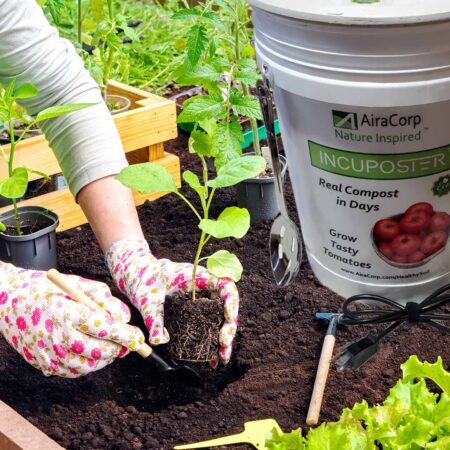Should You Wash Your Hands After Working with Compost?
HEALTHY LIVING :
Compost is not just a blend of decaying organic matter; it can also harbor microorganisms, some of which can be potentially harmful.
The Incuposter™ by AiraCorp kills the bad bacteria and leave the good bacterial.
Share this post

Exploring The Importance Of Hand Hygiene
Gardening enthusiasts often find their hands in compost, tending to their gardens. Composting recycles food waste which contributes to sustainable waste management practices. While composting is undeniably beneficial for the environment and soil health, the question arises: should you wash your hands after working with compost, and why?
Understanding the Compost Composition
Before delving into the necessity of hand washing, it's essential to grasp the nature of compost. Compost is a rich, organic mixture consisting of decomposed plant materials, kitchen scraps, and other organic waste. This nutrient-rich concoction serves as a valuable soil conditioner and fertilizer, improving soil structure and enhancing plant growth.
However, compost is not just a blend of decaying organic matter; it can also harbor microorganisms, some of which can be potentially harmful. Here's why hand hygiene is crucial when dealing with compost:
1. Bacteria and Pathogens:
Compost piles provide an ideal environment for a variety of microorganisms, including bacteria, fungi, and even certain pathogens. While many of these microorganisms are beneficial for breaking down organic matter, some can cause illness if they come into contact with humans. For example, Salmonella and E. coli are pathogens that can occasionally be present in compost, especially when it contains food scraps or animal manure.
2. Cross-Contamination Risk:
Working with compost often involves using gardening tools and equipment. These tools can become contaminated with microorganisms from the compost, which can then be transferred to your hands. If you touch your face, mouth, or food without washing your hands, you risk introducing potentially harmful microorganisms into your body.
3. Protection for Vulnerable Individuals:
It's not just about your own health. If you have young children, elderly family members, or individuals with compromised immune systems in your household, practicing proper hand hygiene after handling compost is even more critical. These individuals are more susceptible to infections, and your hands can serve as vectors for the transmission of harmful microorganisms.
The Importance of Hand Washing
Now that we've established the potential risks associated with handling compost, let's emphasize why washing your hands is essential:
1. Preventing Infections:
Hand washing is one of the most effective ways to prevent the spread of infections. It removes potentially harmful microorganisms from your skin, reducing the risk of illness. Thoroughly washing your hands with soap and water for at least 20 seconds is recommended, as it can eliminate a wide range of pathogens.
2. Protecting Your Family:
By washing your hands after working with compost, you reduce the likelihood of introducing contaminants into your home. This safeguards the health of your family members, especially those who may be more vulnerable to infections.
3. Ensuring Food Safety:
If you're involved in both composting and food preparation, proper hand hygiene is critical. Contaminated hands can transfer harmful microorganisms to food, potentially leading to foodborne illnesses. Washing your hands before cooking or eating is a simple yet effective food safety measure.
4. Promoting Good Habits:
Practicing regular hand washing sets a positive example for others, including children, reinforcing the importance of cleanliness and hygiene. It instills a habit that can serve them well throughout their lives.
Conclusion: The Simple Act of Hand Washing
In summary, while composting is a commendable practice for sustainability and soil health, it's vital to recognize that compost can harbor microorganisms, including potentially harmful ones. To protect your health, the health of your loved ones, and to prevent the spread of infections, it's advisable to wash your hands thoroughly with soap and water after working with compost.
It is worth noting here that hot composters like the Incuposter™ by AiraCorp kill the bad bacteria and leave the good bacterial. This is because the good bacteria like bacillus species are thermophilic and can survive higher temperatures than the other bacteria.
So, the next time you're in the garden or handling compost, remember to keep those hands clean or consider purchasing an Incuposter™ – your health and the well-being of those around you depend on it.
Key Takaway
